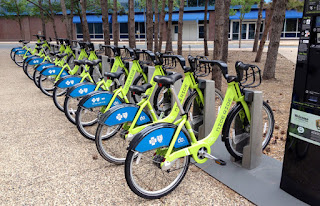 Urban transportation in Nigeria is reputed to having the
largest number of motorcycles circulation in the whole world. “Okada” as they are popularly called; is most favored
by almost everyone, rich and poor because it is fast, cheap and less crowded.
But this mode of transportation has taken a new and dangerous dimension in
Lagos due to the New Lagos Traffic Law which has banned its operation on major
roads and some lucrative areas. Just a few days a ago, as I was coming back
from work, I saw some Okada riders running at such speed that one fell straight
into a ditch; twisting one of his knees and cutting off completely the toes of
his passenger. This was just because they sited police a vehicle. The new Lagos
Traffic Law is now a nightmare for both “okada” riders and the public.
Urban transportation in Nigeria is reputed to having the
largest number of motorcycles circulation in the whole world. “Okada” as they are popularly called; is most favored
by almost everyone, rich and poor because it is fast, cheap and less crowded.
But this mode of transportation has taken a new and dangerous dimension in
Lagos due to the New Lagos Traffic Law which has banned its operation on major
roads and some lucrative areas. Just a few days a ago, as I was coming back
from work, I saw some Okada riders running at such speed that one fell straight
into a ditch; twisting one of his knees and cutting off completely the toes of
his passenger. This was just because they sited police a vehicle. The new Lagos
Traffic Law is now a nightmare for both “okada” riders and the public.
As usual, I began to ponder on a possible solution to this very
dire situation and I stumbled upon a very successful bike transportation model
called Bike Sharing that is working pretty well in America and I though to share
it with my readers, the government and possibly implement it here in Nigeria.
Bike share programs are spreading across the United States
like carbon-reducing wildfire. Since the launch of the first modern U.S.
bike-share system in 2008 (yes, the system has been around for decades, but
2008 was the first theft-proof and functioning system), 29 have popped up. In
2012 alone, eight new cities have set up bike share programs with more
scheduled to begin in cities like New York, Los Angeles, and Fort Worth.
Capital Bikeshare in Washington, D.C. is the model share
program of the moment. Starting in 2010 with 1,100 bikes and 18,000 members,
the program now has over 1,670 bikes and 175 pick-up and drop-off stations,
making it the largest sharing consortium in the country.
The major reason that bike shares actually work is the
technology that keeps a share organization’s inventory in check. Free and
coin-operated programs usually succumbed to theft, but new innovations in
inexpensive bicycle tracking technology keep the fleet intact.
The effects of going into a bike share are predictably
beneficial, but here are some hard numbers. Capital Bikeshare’s 2011 member
survey showed that over 41 percent of users reported that they cut down on time
in their cars since joining, adding up to driving 523 miles less per year, or
487.7 pounds of carbon dioxide emissions. Capital’s members kept 1,632 tons of
carbon dioxide out of the air in the organization’s first year. Most bike-share
programs average a $75 annual fee, which, according to the same survey,
translates to a driver saving about $819 a year instead of driving a car or
traveling via taxi.
If you want to get in on the communal action, here’s a list
of the nation’s share programs. Expect more to pop up soon, too. Most programs,
like those in Minneapolis and Washington, D.C., took between 12 and 18 months
to get going. As for costs, Minneapolis specifically got their system to 700
bikes (Nice Ride Minnesota) for $3.2 million – compare that to the average $60
million cost required to build a mile of urban highway. And for bike retailers
worried about losing sales in the face of bike shares, data shows that the
programs actually promote bicycle sales.
This model for our dear Okada riders?
Got a creative information. Understand well in this. This gives the easy technique of experiment. New technologies are developed more. so techniques are also improved.
ReplyDeleteBack to original